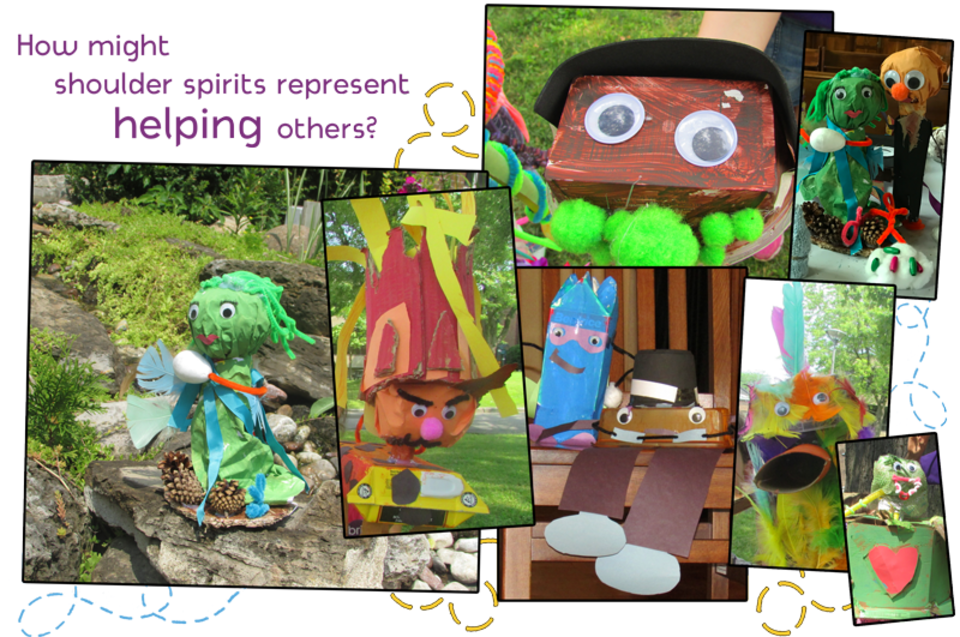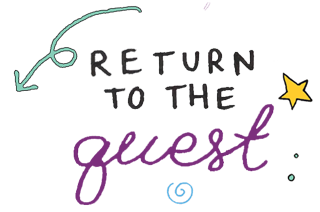
Shoulder spirits (Part 2)
You are now at the second part of your creative project! If you have already finished the first part—Creative Conception—you can continue your quest with this activity. But if you haven't finished the first part yet, then start with that one, then you can come back here.
...
| Objective: To create the two little creatures that sit on your shoulders to support you! |
Duration: 60 to 90 minutes
Material:
- A sheet of paper or a piece of cardboard
- Coloured pencils, felt-tip pens, eraser
- Scissors, glue, arts and crafts materials
Instructions:
- Reread your sheet. Take a moment to reread your ideas and review your Creative Conception draft. This will refresh your memory and maybe even give you some new ideas before you get into the final part of your project.
- Create your shoulder spirits. Here we go! It's time for you to create the shoulder spirits you have imagined! On a new piece of paper or on a large cardboard—if you need more space to bring your ideas to life—use all your talent and care to draw the shoulder spirits, then write their advice and thoughts in speech bubbles. Add colour and lots of details to enhance your creations!
- Variation: If you want to, you can also use recycled materials, glue and paint to create three-dimensional shoulder spirits. This way you can carry them on your own shoulders—and they'll be able to advise you!
- Think about your creative experience. Finally, after you've finished, you can ask yourself: How did it go? Did you succeed in realizing the vision you had at the beginning?
- Conception: Does your creation represent what you think help is? How do your creative choices reflect your perspectives on the concept?
- Application: What lessons can be learned from your interpretation? Is it possible to help yourself? Why or why not?
- Alternative: What could you have changed? Are there nuances that you didn't include? Imagine that your spirits leave your shoulders and perch themselves on another person’s shoulders. Do you think their advice could also help another person, or even everyone?
You can write your answers on the back of your conception sheet to keep track of your evolving thoughts.
...
Bonus: Think of one person in your life who often gives you advice. Once you have this person in mind, remember the different pieces of advice they have given you. Was it all good advice? But wait... what's good advice? Can you identify the criteria that can help you tell the difference between good and bad advice? After thinking about the advice itself, you can also consider the person offering the advice. How well would a person have to know you in order to give you good advice? Do you have to trust them? Do they have to have a lot of experience or be very smart? To gather all your thoughts, you can create the "Good Advice Guide" in which you will give advice... about giving good advice! |

| Tricks for tots: Once you've drawn or made your shoulder spirits, go through the rest of the day keeping them with you. Every time you have to do something, imagine their thoughts. In front of your sock drawer, one tells you to choose the colourful pair, while the other begs you to go barefoot. In front of your bedroom, one tells you to read a book all cuddled up in a blanket, while the other tells you to go outside to play. Do they help you with your choices... or do they actually make your life more complicated? Can you get too much advice? Is advice always a good thing? Why or why not? |
| Tips for teens: Have you ever heard the term "mansplaining?" It's a concept that was popularized by American feminists. It refers to a situation in which a man explains to a woman something she already knows—or has even invented—in a patronizing way, as if she couldn’t figure out the solution or find the information on her own. Is advice always welcome? Can it belittle the intelligence of the person receiving it? Should we assume that everyone is equally intelligent? Why or why not? To push your thinking further, ask yourself whether adults ever explain to young people things they already know... Is it possible to be a victim of "adultsplaining?" |
Share your creative reflections by sending them via email.
Include photos of your projects and notes of your thoughts, as well as your first name and your age!


